
Credit: Yakov Vladimirovich Steinberg
Alekhine vs Capablanca: The Rivalry
Explore one of the Greatest Rivalries in the History of ChessAlexander Alekhine and José Raúl Capablanca are two of the greatest legends of the game. They had a rivalry spanning a quarter of a century from 1913-1938.
First Meeting - 1913
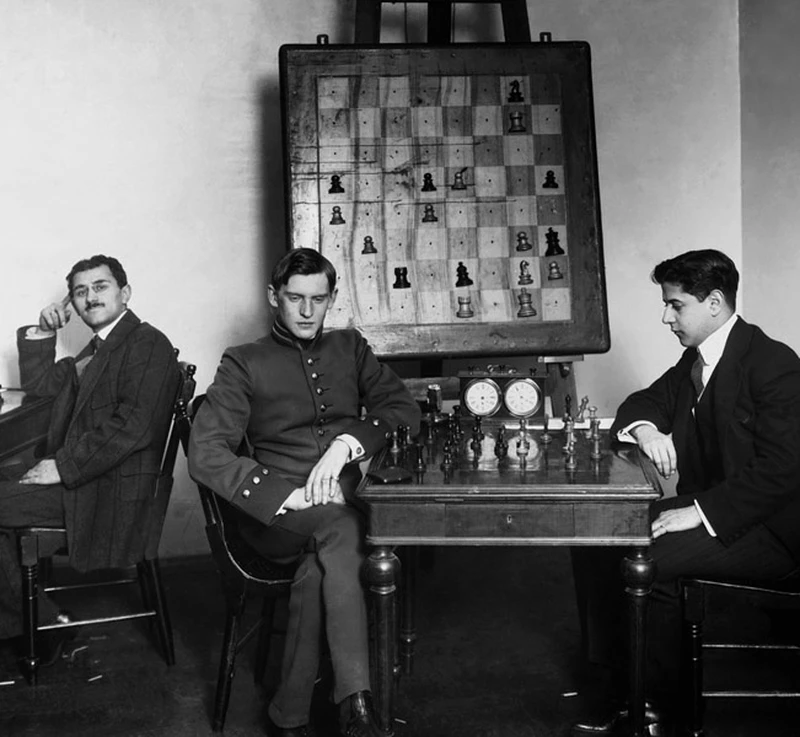
Alekhine and Capablanca during their first ever game at the 1913 Savorin Cup tournament. The display board shows the final position. After the game, they recreated the position after 18.Be4 and took a photo (photos required people to hold still due to long exposure times). Credit: Yakov Vladimirovich Steinberg.
Capablanca won their other game at the Savorin Cup. They also played thrice at the 1914 St. Petersburg tournament, where Capablanca scored two wins against Alekhine and a draw.
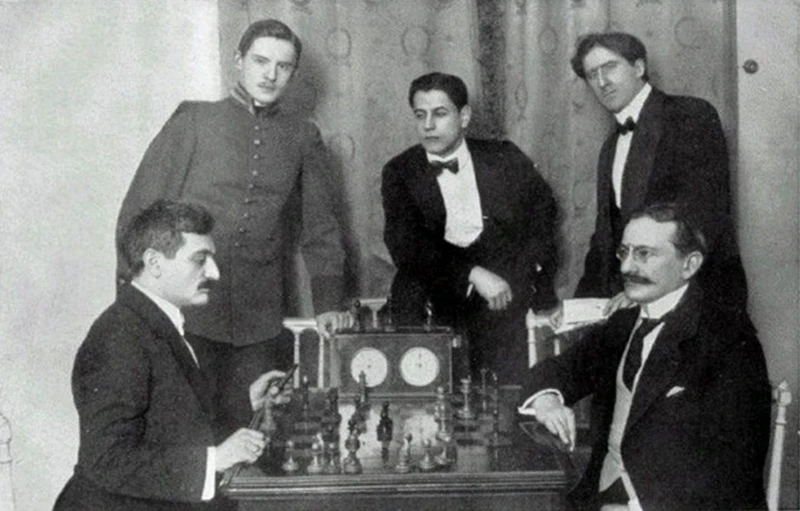
1914 St. Petersburg tournament group photo. Alekhine, Capablanca and Marshall standing. Lasker sitting on left, Tarrasch sitting on right. Credit: Unknown
This was Capablanca's prime where he won virtually all his tournaments.
In 1921, Capablanca defeated Lasker 9-5 to win the World Championship.
Afterwards, Alekhine officially challenged Capablanca for the World Championship.
Dear Mr. Capablanca, —The International Tournament in The Hague has just concluded in victory for me I managed to score 8 points out of 9, or about 89 percent, without losing a single game. Second was Dr. Tartakower with 7 points and third Rubinstein with 6½. Fourth and fifth were Kostic and Maroczy with 5½.
This success, following the ones at St. Petersburg, Mannheim and Budapest, seems to justify my desire for a serious meeting with the world champion. Consequently, I should be grateful if you would consider the present letter as an official challenge to a match for the World Chess Championship.
Nonetheless, since I have read that, on the basis of his pre—War successes (in 1912), the Polish master Rubinstein has already sent you a similar challenge and that you have accepted it, I should be quite ready, if that match has already been fixed for a more or less precise date, to await its conclusion to have the honor and pleasure of measuring myself against you. In any case, I should be most obliged if you would send me your reply in principle on this matter, together with possible conditions under which, in your view, a match between the two of us could take place.
Yours sincerely, Alexander Alekhine
Letter to Capablanca from Alekhine, The Hague, 7th November 1921. In Edward Winter, Capablanca
Therefore, Capablanca put Alekhine on 'the list'. First Capablanca would play Rubinstein as he challenged first, and then he would play Alekhine (unless Alekhine would defeat Rubinstein in an anticipated 1922 match). In order to play, Alekhine would also have to raise money for the match.
1922-1926
In the 1922 London Tournament, Alekhine and Capablanca played a quick 17 move draw.
"There was a curious incident today. After my game was finished, an onlooker, very much surprised at Alekhine's attitude at the time, approached him and asked him in a pitiful tone why he had resigned so soon. Alekhine's answer was that he had not resigned, whereupon his questioner asked him then why had I resigned. Alekhine was by this time in a quandary. Finally he thought the onlooker was not very well versed in the intricacies of the game, and therefore he took the trouble to explain that the game had been declared a draw because there was not very much to do on either side."
Capablanca, The Times newspaper article, 12th August, 1922, p.14, In Edward Winter, Capablanca, p.146.
The London Rules were a set of rules regarding a World Championship which Capablanca drafted. This was before FIDE had regulated World Championships so challengers had to put up money to play Capablanca.
Alekhine, Bogoljubow, Maróczy, Réti, Rubinstein, Tartakower and Vidmar all signed and agreed to them. Among the rules was that the World Championship was to be fought until one player got six wins.
Regarding the prize fund: ‘The champion will not be compelled to defend his title for a purse below ten thousand dollars ($10,000), in addition to which sum the traveling expenses both ways of both players, as well as their living expenses during the progress of the match, must also be provided for.’
The rules for a match could also change if the Challenger and the World Champion agreed.
In the 1924 New York Tournament they played six games. Four were quick draws, one was a fighting draw and the other game was won by Capablanca.
The Capablanca-Rubinstein match never happened as Rubinstein couldn't raise the money, neither could Marshall or Nimzowitsch in their challenges. Alekhine got his chance to play in 1927 after managing to raise the money.
1927 World Championship
The 1927 World Championship was a mammoth battle, with over thirty games of chess being played in two and a half months. The match predictions by the masters of the time all viewed Capablanca as an easy favourite to win. As per the London Rules, the winner would be the first one to win six games. The match took place in Buenos Aires, Argentina.
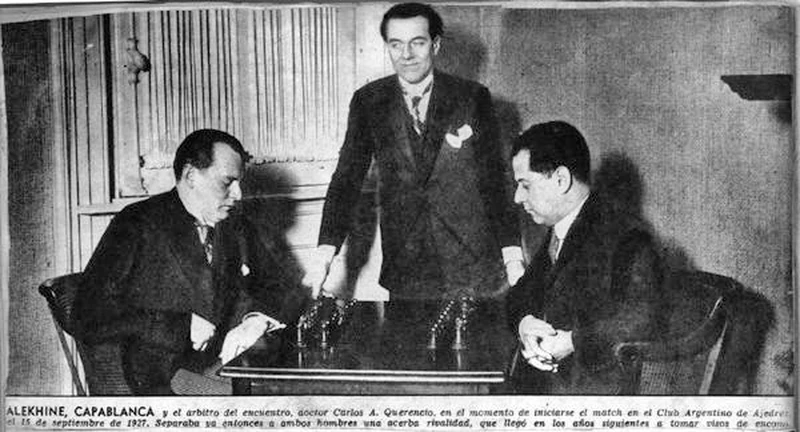
Translation: Alekhine, Capablanca and the arbiter of the match, doctor Carlos A. Querencio. At the start of the match at the Argentine Chess Club on the 15th of September 1927. The two men were then separated by a bitter rivalry, which in the following years came to take hold. Credit: Unknown
Game 1 started with Capablanca playing white. However, he lost the game to Alekhine. Starting the match this way must have been painful for Capablanca.
Game 2 was a quick 19 move draw in the Queen's Gambit Declined. The match was famous for its large amount of draws (only 9 decisive games out of 34).
Capablanca bounced back in Game 3 to level the score at 1-1.
After 3 draws, Capablanca racked up another win in Game 7 to lead the match 2-1
After 3 more draws, Alekhine evened the score once more in Game 11. 2-2
Alekhine won again in Game 12 to get two back-to-back wins against Capablanca. Capablanca lost due to an elementary blunder. This was a heavy shock for Capablanca. (3-2 for Alekhine).
When asked about this game later, Capablanca stated: "Yes, that was shocking. I cannot recognize myself as the player who lost it."
After eight consecutive draws, Alekhine won game 21. (4-2 for Alekhine)
In Game 27, Capablanca had a winning position but blundered into a draw. Reflecting on this game later, Capablanca stated: "I knew then that the jig was up."
Capablanca won in Game 29 to bring the score to 4-3.
Alekhine went on to win Game 32. Now Alekhine only needed one more win to become World Champion. (5-3)
Game 34 took place over four days due to adjournments. As Alekhine had 5 wins so far, Capablanca could not lose any more games. Capablanca also had to win 3 more games to win the match.
With this win, Alekhine now had six wins, and with it the World Championship. Alekhine became the fourth World Champion.
Capablanca did not show up to the closing ceremony as he thought the act of a public ceremony for the winner was unbecoming and pretentious (he said he felt this way on similar occasions and opposed public shows of victory).
Dr Lizardo Molina Carranza
President of the Club Argentino de Ajedrez
Dear Sir,
In my opinion, Dr Alekhine was already proclaimed world champion, not only here but throughout the entire world, from the moment when, through the official match referee, Dr C. Querencio, I sent the letter in which I resigned the final game.
Moreover, in similar cases I have always emphatically opposed any act of public ostentation. It is clear that the organizing committee of the match is applying a different criterion.
Given our difference of views with respect to these matters, permit me to refrain from attending tonight at the Chess Club.
As regards my share of the purse, I am asking Mr Ricardo Illa, the official match treasurer, kindly to retain it for me until I go to his office to collect it.
Yours sincerely,
J.R. Capablanca.’letter to the President of the Argentine Club, 8th December 1927. In Edward Winter Chess Note 3428
Alekhine's thoughts on the match:
“Psychology is the most important factor in chess. My success was due solely to my superiority in the sense of psychology. Capablanca played almost entirely by a marvellous gift of intuition, but he lacked the psychological sense.”
Alekhine, Eclaireur de Nice, 24th November, 1927
"...How did it happen that [Capablanca] lost to me? I must confess that even now I cannot answer this question with any certainty, since in 1927 I did not believe that I was superior to him. Perhaps the chief reason for his defeat was the over-estimation of his own powers arising out of his overwhelming victory at New York 1927 and his under-estimation of mine."
Alekhine on his 1927 match with Capablanca, 1942
Capablanca's thoughts on the match:
"I confess it did. I never dreamt that my former good form could fail me at such an inopportune time. But Dr Alekhine is worthy of any man’s steel. If you don’t believe it, try it."
Capablanca when asked if he was surprised that Alekhine beat him
"I cannot fully explain it and I hate alibis. The fact is that I was not my normal self and I made mistakes that now that I look back upon them are quite unaccountable."
Capablanca, Brooklyn Daily Eagle, page C3, 12th February, 1928
1927-1933
In the aftermath of the match, Alekhine and Capablanca agreed to have a rematch sometime with the same rules.
The negotiations for a rematch is when the relationship between Alekhine and Capablanca went south.
Firstly, FIDE had just been established in 1924 and now they were trying to bring the world championship under their purview and watch.
Alekhine was piqued and annoyed at the fact that after the match, Capablanca wrote to FIDE recommending changes to the match format. Capablanca then sent a copy of the letter to Alekhine. Alekhine was upset as he had a verbal agreement with Capablanca that the rematch would have the same rules.

Excerpt from Alekhine's letter to Capablanca, Paris, February 29th, 1928, Given in the American Chess Bulletin, March 1928
Capablanca said that he did not write to FIDE to change the rules for the rematch, but as a general guide for future matches under FIDE in general.
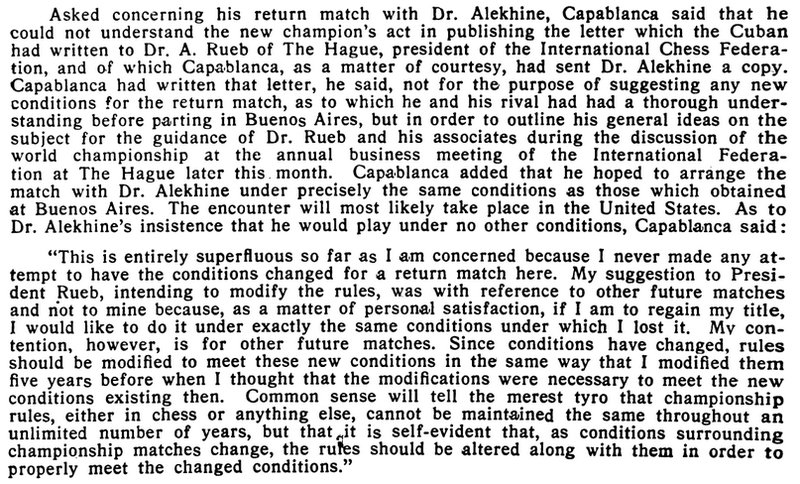
Capablanca comments on Alekhine, Given in the American Chess Bulletin, July-August 1928
Capablanca made an official challenge to Alekhine on October 8th 1928.

Capablanca's official World Championship challenge to Alekhine, Berlin, October 8th, 1928, Given in the American Chess Bulletin, December 1928
Alekhine said they could play after his match with Bogoljubow.
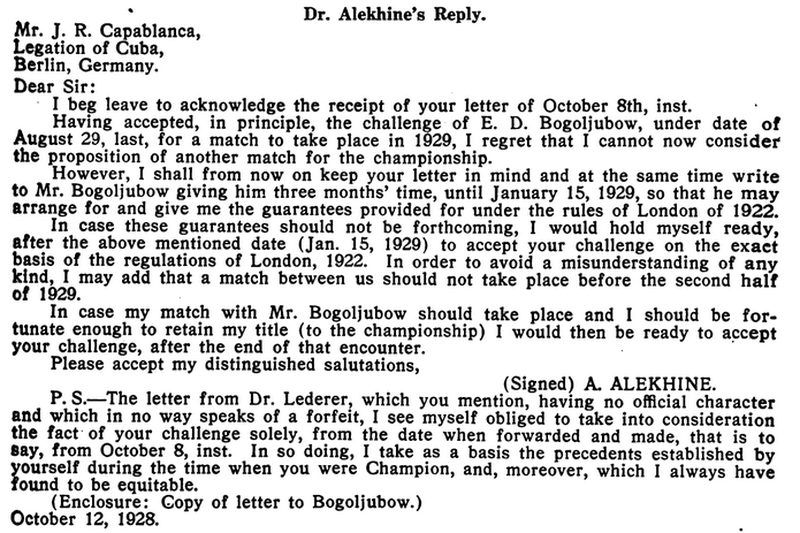
Alekhine's reply to Capablanca, Berlin, October 12h, 1928, Given in the American Chess Bulletin, December 1928
Alekhine told Bogoljubow about Capablanca's challenge.
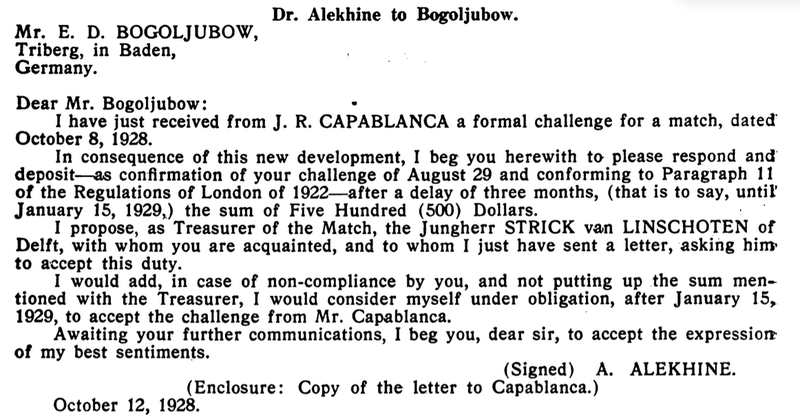
Alekhine's reply to Bogoljubow, Berlin, October 12th, 1928, Given in the American Chess Bulletin, December 1928
"The match with Bogoljubow interests me far more than the battle with Capablanca... Bogoljubow is a much more serious opponent."
Alekhine, Deutsche Schachblätter, 1st February, 1929, (p.35-37), In Edward Winter, Capablanca p. 215
"Alekhine contemplates a visit to this country [America] in March for the purpose of making a tour and also, it is understood, to pave the way for the preliminary negotiations for a return match with Jose R. Capablanca of Havana to be played in this country during 1930, provided of course, that he does not lose the match to Bogoljubow to be played in the fall of this year."
American Chess Bulletin, February 1929

American Chess Bulletin, February 1929
In August 1929, Capablanca played the Carlsbad tournament. Alekhine did not play as he was due to play the World Championship Match. However, he was a correspondent on this tournament for the New York Times.
"Regarding the sporting point of view, however, Capablanca’s defeat has a positive value in that it prevents a new legend of his inviolability, which this tournament would have more than justified, being built up because he twice before was clearly exposed to defeat and only had to thank the carelessness of his opponents for his rescue."
Alekhine, New York Times, 28th August 1929, p.19-20, In Edward Winter, Chess Archive: Alekhine on Carlsbad, 1929. (On Capablanca's loss to Spielmann in round 20).
"Capablanca delivered some games which owing to a symmetrical style had an aesthetic effect. Even if there is any question of his indisputable superiority over precedent players, he nevertheless is one of the foremost and likely to remain so for a long time."
Alekhine, New York Times, 30th August 1929, p.13-14, In Edward Winter, Chess Archive: Alekhine on Carlsbad, 1929.
The Bogoljubow-Alekhine match was held from September to November 1929. Alekhine defended his title, winning 15.5-9.5.
"...can you imagine B. [Bogoljubow] winning two games from me or Dr. L. [Dr. Lasker] so early?"
Capablanca, letter to Norbert Lederer after Bogoljubow won games 4 and 6, In Edward Winter, Capablanca (p.217)
During the match, Capablanca drafted a formal challenge in advance to Alekhine, anticipating Alekhine winning the match.
After winning the match, Alekhine accepted Capablanca's challenge for a match. Other challenges were suspended while he waited for Capablanca to raise the money.
The 1930 match fell through as Capablanca couldn't raise the money for the match (The stock market crashed in late October 1929). So in June 1930, Capablanca asked to move the match to early 1931. In a following letter, he then changed it to the Winter of 1931-1932, saying that the previous date was a clerical error in the letter.
In February 1931, Capablanca issued another challenge to Alekhine, saying that if Alekhine did not accept he would claim the world championship title by default.
In March 1931, Alekhine responded to Capablanca, accepting his challenge with certain conditions and objecting to Capablanca's ultimatum regarding the date of the match. Alekhine said this was in violation of Paragraph Ten of the London Rules: 'The champion shall have the right of naming the date for the beginning of the match...'. Alekhine set the start of the match to be between August 15th - September 15th, 1931. One of the conditions that Alekhine put down was that the $500 deposit be subject to arbitrage due to the previous match failing to materialize.
In May 1931, Capablanca withdrew his challenge. After mid 1931, Capablanca did not play any tournaments until December 1934.
In 1934, Alekhine won a rematch for the title against Bogoljubow, 15.5-10.5.
Alekhine's prime was the early 30's where he won virtually all his tournaments.
"Be this as it may, with the loss of his title Capablanca also lost his form for some time, and began to pursue a policy that, given that he really wanted a return match, was calculated in no way to bring about such an eventuality, to put it mildly. Immediately after his defeat in fact, he sought to bring about through FIDE...new conditions for a title match, and this without consulting me. This was the sort of procedure I could not tolerate and thus there arose a coolness and difference between us."
Alekhine on his relationship with Capablanca, 1942
"I've been challenging him for four years, since he won the championship, but he never decides to accept my challenge. He doesn't say "no," but the championship isn't being held. He locks himself up in interpretations of the rules of chess. Imagine, they're rules I made myself! And sometimes with one pretext and sometimes with another, he keeps "dragging" the match, without me being able to see him face to face. Last year he said that he "agreed that the match would be held between August 15th and Havana, either in New York or Havana." But you will understand that it was a pretext, because at that time of year there is no one in New York who might be interested in chess, and in Havana it is not the time to hold a championship of that nature either."
Capablanca, interview with Adelardo Fernández Arias in the newpaper ABC on 12th May, 1932. (Translated from Spanish).
1934-1938
In 1934, Capablanca met the Russian socialite Olga Chagodaef (née Choubaroff) at a New York party. Boldly, he told her the first time they met that she would be his future wife. After Capablanca's hiatus, falling in love made him return to fight for the crown. Capablanca started playing tournaments again and had a resurgence.
"I already shared Capablanca’s feelings. When he returned to New York and kissed me, I told him so. “This is our fate”, said Capa. “I knew it from the very beginning. I shall regain my crown for you. There were years when life had been rather meaningless to me, but now I shall return to my own. I shall prove again that I am the best chess player in the world”."
Olga Capablanca, In Edward Winter Chess Article: The Genius and the Princess
"He very seldom mentioned his past successes in chess. As a rule, he did not speak of chess. He was a very proud man. No doubt the loss of his crown involved great humiliation for him and suffering. We never touched that theme. It is true that Capa very much disliked Alekhine, to say the least, but he did not criticize his chess. I don’t think Capa ever gave up hope of getting another championship match."
Olga Capablanca, In Edward Winter Chess Article: The Genius and the Princess
In 1935, Alekhine would play Euwe for the World Championship. In this video Capablanca gives his thoughts on the players.
https://youtu.be/ck6lcXo7vMA?t=81
Alekhine was defeated by Euwe 15.5-14.5. Euwe became the fifth world champion.
In 1936, after nine years Capablanca and Alekhine finally played again at the Nottingham tournament.
During the game, Alekhine forgot to seal his move for the adjournment and instead played it over the board. As a result, Capablanca was asked to seal his move instead by the arbitrating committee.
In 1937, Alekhine beat Euwe 15.5-9.5 in a rematch. Alekhine became the world champion once again.
In February 1938, Alekhine participated in the Montevideo tournament in Uruguay. The Chess Review magazine reported that another object of this visit was to complete arrangements for a 1939 match with Capablanca. In June 1938, The Chess Review reported that Alekhine said that Capablanca's financial demands were excessive. The magazine also reported that Capablanca "does not deign to say anything to amplify this statement". The article concluded: "we are left completely in the air as to who is right and who is wrong, and what the upshot of it all will be".
In November 1938, Alekhine and Capablanca played in the AVRO tournament. Their first game was a draw and Alekhine beat Capablanca in the second game (played on Capablanca's 50th birthday), which was the last game they ever played. Capablanca suffered from hypertension (high blood pressure) during the tournament and lost three games in the second half of the tournament, finishing second to last.
Alekhine Interview 1938.
https://youtu.be/GRCvqr7XJAo?t=35
1939-1946
The outbreak of WW2 in September 1939 meant that the chess world was thrown into turmoil. The countries of the European chess masters were quickly being invaded by Germany.
In the October 1939 Buenos Aires Tournament, Alekhine and Capablanca were due to play each other on their respective boards. But Capablanca skipped the round, having explained to the Argentine Chess Federation in advance that he would not be playing Alekhine.
"Last night’s match between France and Cuba was drawn two-all. I should like to explain my absence, which was due to purely personal reasons.
Neither France nor Cuba was a leading contender in this competition, which meant that from that point of view there was no special significance in whether or not I played. There was only the question of the spectacle itself, which of course could not influence the course of the tournament.
Once more it is necessary to emphasize that the event being held at the Politeama is a tournament for teams, not individuals. A week ago I notified the Argentine Chess Federation that I did not intend to play against Alekhine, and I explained my reasons for this decision.
I made this announcement to the Federation so that my intentions were known in advance, and to prevent disappointment on the part of the public. My not playing yesterday was thus not an act of discourtesy to the Federation, nor a lack of consideration for the Buenos Aires public.
Therefore there was no question, as has incorrectly been stated, of my refusing a favour asked by the Federation. I have, and have always had, the best intentions towards the chess public and the organizing body."
Capablanca, article in the Argentine newspaper Crítica, 15 September 1939
After the Olympiad, Capablanca went for one last try for a match with Alekhine.
"My dear friend,
I did not reply to you earlier, so as to be able to give you the good news about the agreement on the match for the world championship. It appears that all is going well and that tomorrow everything will be signed.
As the airmail leaves tonight, I can wait no longer to give you the news.
You will understand what this has cost, and especially since Cuba, as usual, has left me in the lurch. If I had had the five thousand here, everything would have been settled better and faster. But that is about to pass into history, and now is the time to turn to the future and not to what has happened."
Capblanca, excerpt from letter to the President of the Cuban Chess Federation, 23rd October, 1939
"Dr. Alekhine is to play Capablanca for the championship of the world. Rumors and reports, neatly balanced by an identical number of contradictions, have recently flurried around the globe, but seem finally to have crystalized into this glittering gem of news.
Reports from Buenos Aires state that negotiations have been successfully concluded. Buenos Aires will be the scene, and the opening game is scheduled for April 14, 1940.
A purse of 10,000 gold dollars is to be provided by the Argentine Chess Federation. Alekhine is to receive $2,000. outright, while the balance will be divided 60% to the winner and 40% to the loser."
The Chess Review, November 1939.
Of course, the match never happened. In December 1939, Alekhine departed Buenos Aires, on account of being in service for his country France during the war. Alekhine sent a cable to Havana in July 1940 from Marseille, France requesting a visa on the grounds of completing negotiations for the match that had been started in 1939.
In April 1941 from Lisbon, Portugal he sent a letter to the Cuban Minister disputing statements that Capablanca had made to the New York press about the match. Alekhine stated that Capablanca was wrong in asserting that his reasons for a visa had been a pretext for obtaining an exit visa from France as he had been demobilized from the army many times and had American and Portuguese visas. Referring to Capablanca surprise at Alekhine's lack of correspondence with the Argentine Chess Federation, Alekhine stated that it is the challenger's responsibility to organize matches and that his communication to Havana was also a gesture that he was ready to play Capablanca. He concluded by saying that he accepts Capblanca's challenge on the terms of the 1939 Buenos Aires contract and that Capablanca should let him know immediately if he will play as he has two pending challenges from two young grandmasters.
Capbalanca died in 1942. Alekhine died four years later in 1946.
Final Thoughts
"Capablanca was snatched from the chess world much too soon. With his death, we have lost a very great chess genius whose like we shall never see again."
Alekhine in a tribute to Capblanca in 1942
"Naturally, as far as the endgame is concerned, Capablanca has no rival; no-one among the contemporary masters has any chance to beat him in it."
Alekhine, České slovo newpaper, 17th June, 1923, (p.14)
"Alekhine's game is well rounded and of an even tone throughout. His playing in all departments is of a high order, without showing any salient features, except in comparatively simple positions in the middle game, where, from an apparently even position, he is apt to turn the balance in his favor at the slightest error of his adversary. This last feature is very important because of nowadays, when the technique the openings is so well known, it is very easy to arrive at such positions."
Capablanca after the 1927 World Championship, New York Times, November 30th 1927.
The missing Alekhine-Capablanca rematch is one of the great ghosts of the chess world.
They brought joy to the world through their games and legacy.
They were two of a kind and we shall never see the likes of them ever again.
Sources
Alekhine-Capablanca Games
Alekhine Info
Capablanca Info
1913 Savorin Cup, Capablanca vs Alekhine
Letter to Capablanca from Alekhine, The Hague, 7th November 1921. In Edward Winter, Capablanca
The London Rules
José Raúl Capablanca, My Chess Career, 1920
Alexander Alekhine's Best Games, 1989
1927 World Championship Match info
Alekhine, Eclaireur de Nice, 24th November, 1927 Item 3522 (Ctrl + F, then type 3522)
Capablanca, Brooklyn Daily Eagle, page C3, 12th February, 1928 (match comments) Item 7134
1928-1931 match negotiations
American Chess Bulletin 1928 (p.45-47, p.86-87, p.108, p.174-175).
American Chess Bulletin 1929 (p.21, p.43).
Alekhine on Carlsbad, 1929
1930 Capablanca-Alekhine planned match. Item 918
1928-1931 match negotiations info
1928-1931 match negotiation info 2
Alekhine response March 1931 Item 9968
Capablanca, interview with Adelardo Fernández Arias in the newpaper ABC on 12th May, 1932 Item 6171
Olga Capablanca, In Edward Winter Chess Article: The Genius and the Princess
The Chess Review 1938 (p.35, p.155).
The Chess Review, November 1939 (p.240).
1940 Match Info Items (4696, 4742)
Alekhine Response 1941 Item 10424
Alekhine, Capablanca Tribute, 1942 (Comments, User: BLD9802)
Alekhine, České slovo newpaper, 17th June, 1923, (p.14). Item 2138
Capablanca after the 1927 World Championship, New York Times, November 30th 1927
Alexander Alekhine, Nottingham 1936
Edward Winter, Capablanca
Garry Kasparov, My Great Predecessors Part 1
You may also like
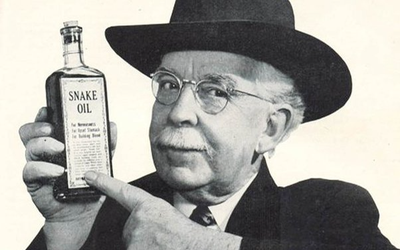 CM HGabor
CM HGaborHow titled players lie to you
This post is a word of warning for the average club player. As the chess world is becoming increasin… RuyLopez1000
RuyLopez1000Did the Soviets Collude Against Bobby Fischer?
I Investigate The Claims By Looking At The Evidence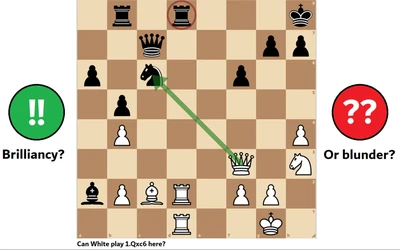 Mcie
McieCalculate until the end.. and one move more!
Blunder or brilliancy, sometimes it all hinges on one more move. RuyLopez1000
RuyLopez1000Fischer vs Petrosian: The Rivalry
Explore one of the Greatest Rivalries in the History of Chess RuyLopez1000
RuyLopez1000Pawn Sacrifice: Movie Review
Tobey Maguire plays Bobby Fischer TotalNoob69
TotalNoob69